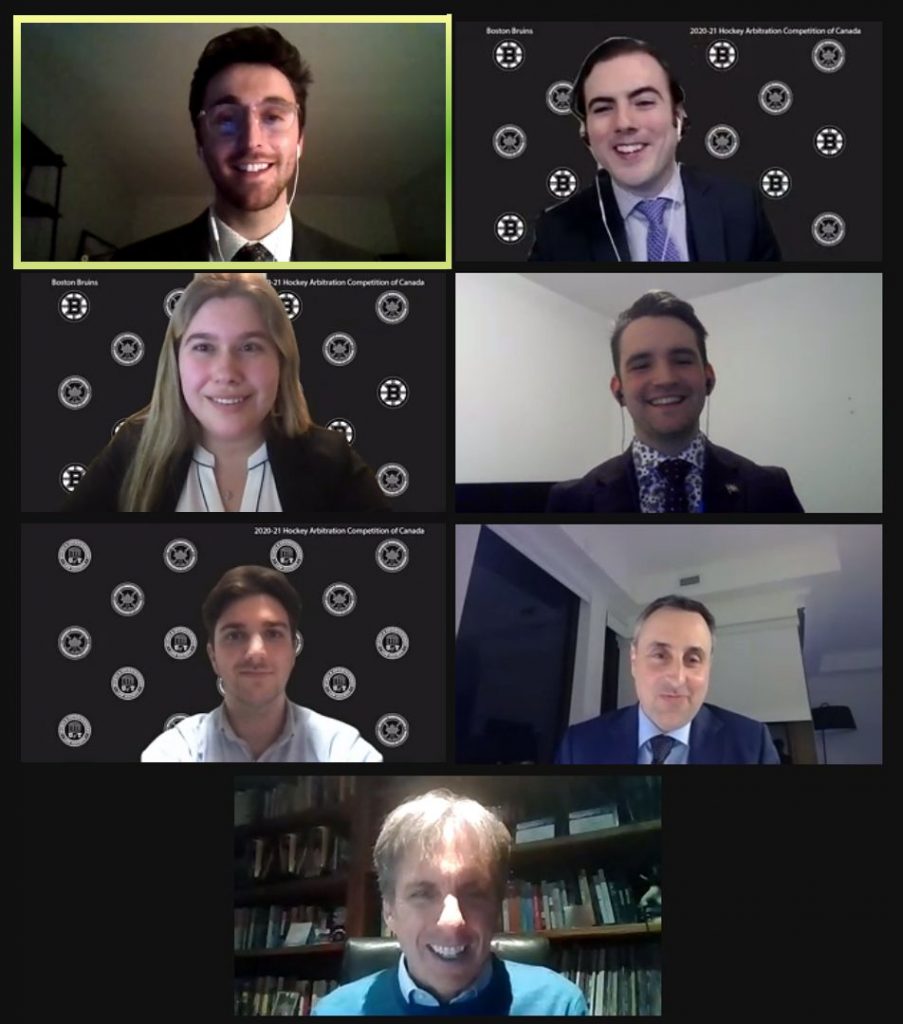2020-21 HACC’s online platform allowed for greater reach across North America

On March 13, U of T Law’s Sports and Entertainment Law Society (SELS) hosted the 2020-21 Hockey Arbitration Competition of Canada (HACC). In light of the pandemic, this year’s HACC was held virtually over Zoom in one day, from 9 a.m. to 6 p.m.
HACC is a mock salary arbitration competition hosted annually by SELS, since 2012. The competition is open to law students across Canada and the United States. This year, 26 teams representing 14 law schools competed in HACC, including three American law schools (Pepperdine University, Villanova University, and Cornell University). SELS also extended a special invitation to one Ryerson Law team to help foster the sports and entertainment interest at the newly founded law school. Four U of T Law students, Emma Weiss (3L), Sophie Chitiz (2L), Amy Yun (1L), and Robin Chang (1L) formed two teams and represented the Faculty of Law.
The 2020-21 HACC started with a preliminary round. Each team competed with a randomly assigned opposing team. Afterwards, the winners of the preliminary rounds, and each successive round, competed until there was a final winner. The teams represented either the players or the club and prepared mock NHL salary arbitration briefs. During the competition, competitors presented oral submissions to guest arbitrators with extensive salary arbitration experience. Each team had 18 minutes to present and rebut the other side’s arguments every round. After deliberation, the guest arbitrators chose a winner and provided feedback.
Gerrit Yau (2L), Co-President of the SELS and Co-Director of the 2020-21 HACC, commented that although this year’s virtual event presented new challenges to the team, it also offered valuable opportunities as more law schools and industry professionals from outside of Ontario were able to participate.
“My goal has always been to grow the legacy of HACC in order to introduce and promote opportunities in the sports and entertainment industry,” said Yau. He continued, “I wanted to promote them to law students across Canada and the United States, and I hope that the 2020-21 HACC accomplished this goal with its scale and reach.”
Students told Ultra Vires that participating in HACC was a positive experience. Robin Chang, a hockey fan and 1L competitor, said that HACC was a unique opportunity to develop oral advocacy skills while presenting on topics that he was personally interested in: “All the pointless debates I’ve gotten into with my friends over which hockey player was better finally came in handy.”
HACC was also a highlight for Amy Yun. Yun went from having little knowledge about hockey to arguing in front of esteemed hockey industry professionals. Both commented that the guest arbitrators’ feedback was very helpful. HACC helped them develop general skills in written and oral advocacy and hockey salary arbitration specifically.
Despite being held virtually, the 2020-21 HACC was an engaging opportunity for students interested in sports and entertainment law to sharpen advocacy skills and learn from industry-leading professionals.
“I hope HACC continues to grow as a platform for law students and industry professionals to share an unforgettable experience,” said Yau. Further, he hopes that students can grow their networks in the sports and entertainment industry as they continue their exploration as young legal professionals.
“For me personally, HACC will always be a fundamental part of how I got started in this field,” said Yau.
The results of this year’s HACC are as follows:
Quarter-Finalists:
Team 4 (Osgoode)
Team 6 (McGill)
Team 9 (University of Manitoba)
Team 10 (University of Manitoba)
Team 12 (Pepperdine University)
Team 20 (University of New Brunswick)
Team 24 (Pepperdine University)
Team 25 (Osgoode)
Semi-Finalists:
Team 4 (Osgoode)
Team 6 (McGill)
Team 10 (University of Manitoba)
Team 25 (Osgoode)
Finalists:
2nd Place: Team 6 (McGill – Vincent Couto & Darien Bahry)
1st Place: Team 25 (Osgoode – Jordan Kazan Baigrie & Jeremy Wright)
Best Cumulative Score in Qualifying Rounds:
Team 9 (University of Manitoba – Leah Suderman & Jordan Sinder)





